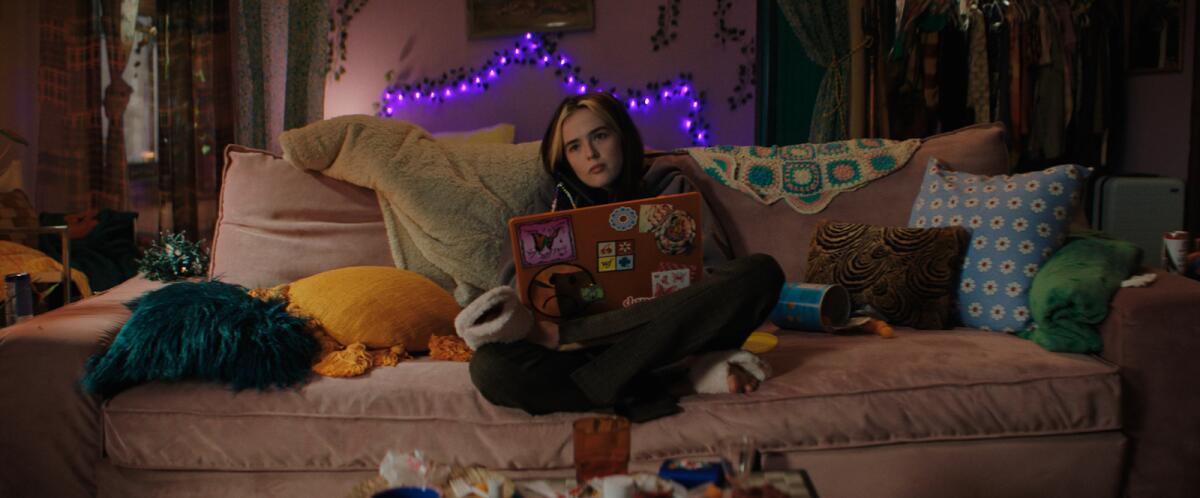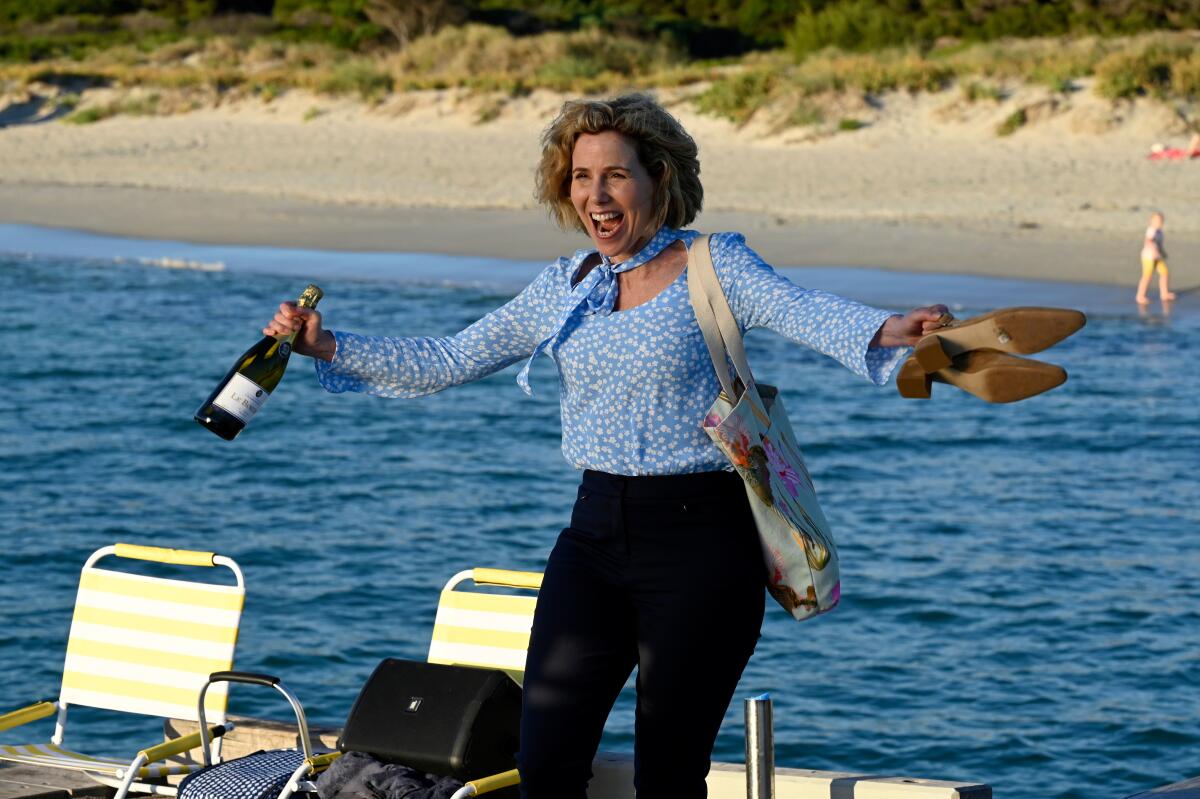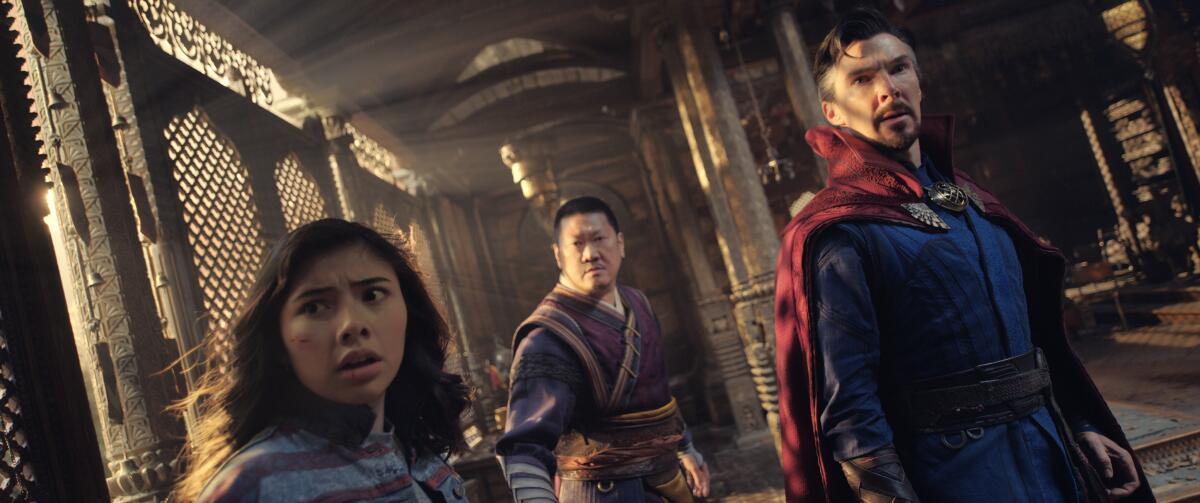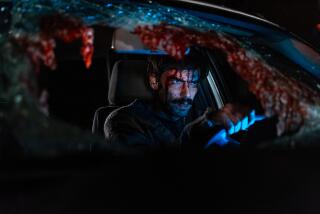Review: ‘Not Okay’ tackles the seductiveness of internet celebrity, plus more weekend movies

‘Not Okay’
Quinn Shephard made an impressive writing and directing debut — in her early 20s, no less — with 2017’s “Blame,” a keen and stylish teen-movie spin on “The Crucible.” Shephard takes an even bigger swing with “Not Okay,” a big-hearted social satire that roasts hashtag activism and influencer culture while still suggesting that people can make a difference if they go about it the right way.
Zoey Deutch plays Danni Sanders, an aspiring journalist tired of being overlooked by the much cooler colleagues and editors at the New York-based website where she works. In a desperate attempt to impress, she pretends to be on a writers’ retreat in Paris — and fakes photos of the trip. When the city is then hit by a series of terrorist attacks, everyone assumes Danni is a survivor, and the surge of attention (not to mention the huge boost in Instagram followers) convinces her to roll with the lie.
Shephard has a lot of fun spoofing the wild ride of being extremely popular online, where relevance is measured in clicks and FOMO can feel as painful as real-world trauma. Shephard balances the comedy with a subplot about Rowan (Mia Isaac), a school-shooting survivor and gun-law crusader whose friendship with Danni boosts the impostor’s credibility. These shifts in the film between earnestness and anything-for-a-laugh comedy sometimes feel off, allowing the audience to excuse the characters’ bad behavior as silly, not reckless.
But “Not Okay” hits surprisingly hard with its ending, reframing a lot of the preceding 90 minutes from a different and harsher perspective. And throughout, Shephard is refreshingly honest about how seductive internet fame can be. “Not Okay” hits its marks more often than not, and at its best it illustrates, step by inexorable step, how a carefully sculpted social media persona can encourage people to fake their way into a real crisis.
‘Not Okay.’ R, for language throughout, drug use and some sexual content. 1 hour, 40 minutes. Available on Hulu.
‘We Met in Virtual Reality’
For all the reasonable anxiety we may have about whether we’re spending too much time online, it’d be wrong to deny that many people rely on the virtual world for a sense of community, a creative outlet and a way to safely explore other cultures and alternate identities. Joe Hunting’s animated documentary “We Met in Virtual Reality” — recorded entirely within VRChat — explores the real relationships that have developed within these virtual spaces and offers an optimistic take on the future of human interaction within an artificial world.
None of “We Met in Virtual Reality” is set “IRL.” There are no dry talking-head interviews with even-handed VR experts, no direct comparisons between the everyday lives of the movie’s subjects and who they are when they put on their headsets. Instead, Hunting just roams openly and curiously through brightly colored fantastical realms, meeting some of the sexy human-animal hybrids and whimsically goofy creatures who have found little corners of VRChat where they can go on dates, have outings with friends, take classes … really, do whatever people do in the outside world but with far fewer physical or logistical limitations.
The character designs and backdrops are amazingly imaginative; and though the movements and rendering are often glitchy, that only adds to the charm of the residents’ casual conversations. It’s reassuring in a way to know that even an online utopia is imperfect, and that in the end it only succeeds because of the goodwill and bright ideas of the people who gather there.
‘We Met in Virtual Reality.’ V-MA. 1 hour, 31 minutes. Available on HBO Max.

‘How to Please a Woman’
Like the recent indie drama “Good Luck to You, Leo Grande” — but crossed with “The Full Monty” and a little bit of “Magic Mike” — the Australian comedy “How to Please a Woman” is about older women looking for sexual fulfillment and the handsome young men paid to provide it. Sally Phillips gives a winning performance as Gina, a 50-year-old who loses her job, then takes advantage of an awkward encounter with a friendly stripper named Tom (Alexander England) to start her own business: hiring out hunky guys to clean houses and, if asked, to provide sexual services.
Writer-director Renée Webster keeps the tone light and at times even jokey, which initially shortchanges some of the issues at play here, such as the demands of sex work and the thin line between commerce and exploitation. But Webster quickly gets to the movie’s real point once Gina realizes her employees may not know enough about romance, fantasy or sensuality to satisfy their clients. When she starts doing customer surveys, the input she gets about what women really want gets her thinking about her own unfulfilling marriage, and whether her affable middle-aged business partner Steve (Erik Thomson) can help her find what she’s been missing.
“How to Please a Woman” is overlong; and it runs out of plot well before it gets to its climax (so to speak). But while its premise is at times iffy, the movie as a whole has a refreshing randiness about it. To her credit, Webster doesn’t shy away from the sex part of this sex comedy. It’s at the center of the picture, because Webster’s women want it — even need it — to be a more central part of who they are.
‘How to Please a Woman.’ Not rated. 1 hour, 47 minutes. Available on VOD.
‘The Reef: Stalked’
The Australian survival thriller “The Reef: Stalked” isn’t a sequel to writer-director Andrew Traucki’s acclaimed 2010 film “The Reef” so much as it’s a new iteration of the same story. Once again a group of friends find themselves stranded in the ocean with a deadly shark nearby; and once again Traucki constructs the plot like a little puzzle, as the characters muster whatever resources they can find to make it safely back to civilization.
The shark’s prey this time are all women: a band of skilled snorkelers that includes two sisters still recovering from a sibling’s recent murder. Their personal trauma affects some of the choices they make — and, frankly, leads to a few soul-searching conversations that slow down “The Reef: Stalked.” Overall, the action here isn’t as taut as it was in “The Reef,” and the shark effects aren’t as impressive. Still, for the most part the movie delivers what it promises. We watch these ladies try to avoid becoming victims by thinking their way through seemingly impossible problems, knowing any mistake could be their last.
‘The Reef: Stalked.’ Not rated. 1 hour, 29 minutes. Available on Shudder.
‘BlackWood’
In writer-director Chris Canfield’s debut feature, “BlackWood,” a gang of outlaws in late 19th century South Dakota force a Native American woman (Tanajsia Slaughter) to guide them on a hunt for gold in a mysterious forest, which turns out to be the home of the legendary man-beast the Wendigo. This horror-western hybrid plays up the pulpier sides of both genres, relying on stock versions of Old West characters and one of those monster-movie plots where people keep stumbling across horribly mutilated bodies yet stubbornly resist the idea that something weird is going on.
Canfield also introduces themes related to the American frontiersmen’s cruel treatment of the natives — a note of seriousness that, while admirable, conflicts with the film’s overall tone. This is more of a movie for anyone who wants to see burly jerks in cowboy hats get knocked around by a giant, hairy humanoid in the gorgeous Black Hills wilderness — and who doesn’t mind waiting through a lot of slow-paced setup to get to some pretty nifty chases and gore.
‘BlackWood.’ R, for violence, gore and language. 1 hour, 38 minutes. Available on VOD.
Also on VOD
“Neptune Frost” is unlike any other movie released this year: a gender-bending science-fiction musical set among a band of revolutionary hackers living in a Rwandan village surrounded by electronic waste. Co-directors Saul Williams and Anisia Uzeyman meld Afrofuturism and modern popular culture into a singular vision. Available on VOD.
Available now on DVD and Blu-ray

“Doctor Strange in the Multiverse of Madness” continues the recent trend in Marvel movies and TV shows toward exploring alternate realities as everyone’s favorite sorcerer (Benedict Cumberbatch) bounces between universes, trying to fix problems caused by his old Avengers colleague the Scarlet Witch (Elizabeth Olsen). The movie also marks a return to Marvel for director Sam Raimi, who helmed the first three Spider-Man movies back in the 2000s. Walt Disney.
More to Read
Only good movies
Get the Indie Focus newsletter, Mark Olsen's weekly guide to the world of cinema.
You may occasionally receive promotional content from the Los Angeles Times.









